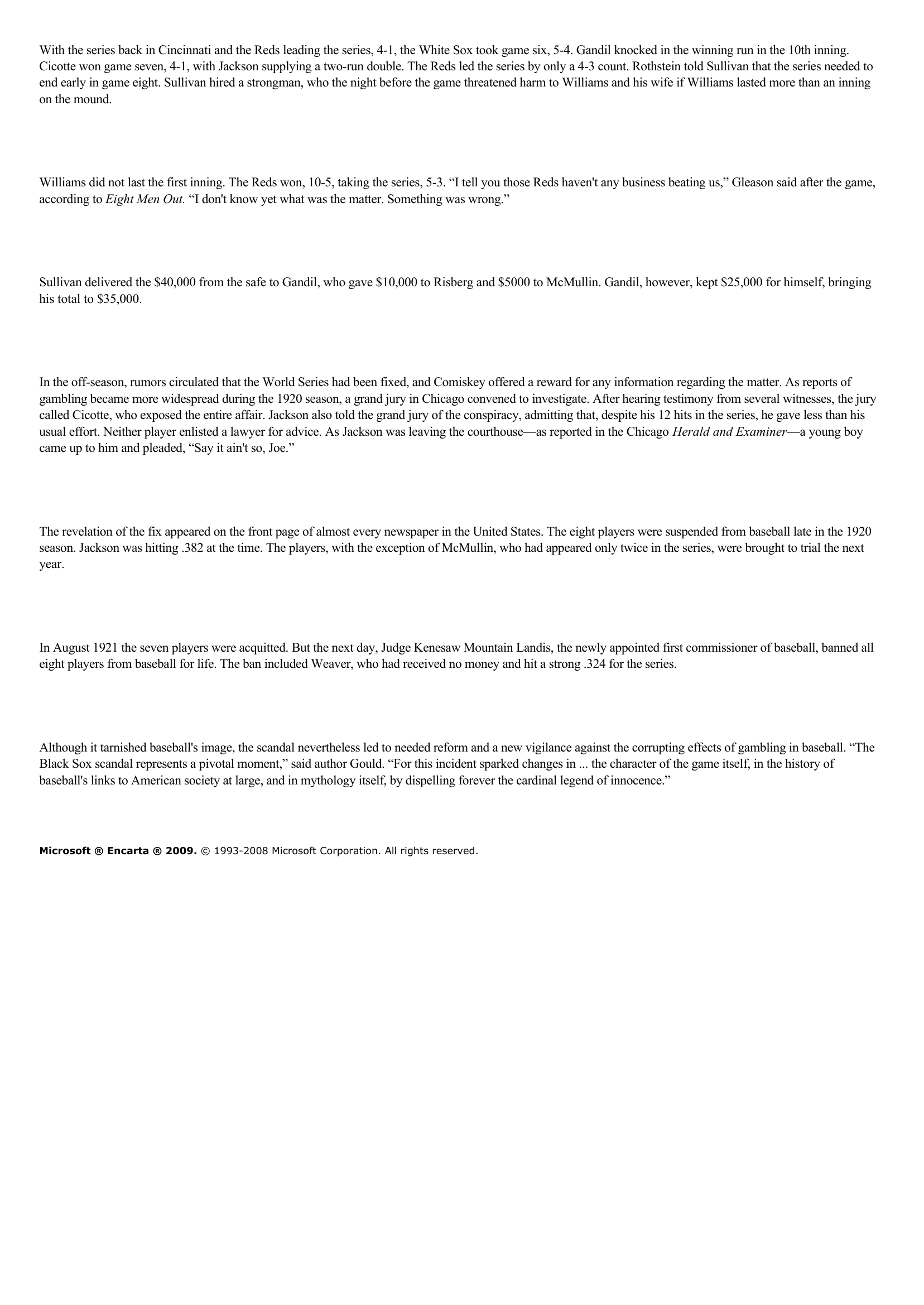Chicago Black Sox Scandal.
Publié le 14/05/2013

Extrait du document
«
With the series back in Cincinnati and the Reds leading the series, 4-1, the White Sox took game six, 5-4.
Gandil knocked in the winning run in the 10th inning.Cicotte won game seven, 4-1, with Jackson supplying a two-run double.
The Reds led the series by only a 4-3 count.
Rothstein told Sullivan that the series needed toend early in game eight.
Sullivan hired a strongman, who the night before the game threatened harm to Williams and his wife if Williams lasted more than an inningon the mound.
Williams did not last the first inning.
The Reds won, 10-5, taking the series, 5-3.
“I tell you those Reds haven't any business beating us,” Gleason said after the game,according to Eight Men Out.
“I don't know yet what was the matter.
Something was wrong.”
Sullivan delivered the $40,000 from the safe to Gandil, who gave $10,000 to Risberg and $5000 to McMullin.
Gandil, however, kept $25,000 for himself, bringinghis total to $35,000.
In the off-season, rumors circulated that the World Series had been fixed, and Comiskey offered a reward for any information regarding the matter.
As reports ofgambling became more widespread during the 1920 season, a grand jury in Chicago convened to investigate.
After hearing testimony from several witnesses, the jurycalled Cicotte, who exposed the entire affair.
Jackson also told the grand jury of the conspiracy, admitting that, despite his 12 hits in the series, he gave less than hisusual effort.
Neither player enlisted a lawyer for advice.
As Jackson was leaving the courthouse—as reported in the Chicago Herald and Examiner —a young boy came up to him and pleaded, “Say it ain't so, Joe.”
The revelation of the fix appeared on the front page of almost every newspaper in the United States.
The eight players were suspended from baseball late in the 1920season.
Jackson was hitting .382 at the time.
The players, with the exception of McMullin, who had appeared only twice in the series, were brought to trial the nextyear.
In August 1921 the seven players were acquitted.
But the next day, Judge Kenesaw Mountain Landis, the newly appointed first commissioner of baseball, banned alleight players from baseball for life.
The ban included Weaver, who had received no money and hit a strong .324 for the series.
Although it tarnished baseball's image, the scandal nevertheless led to needed reform and a new vigilance against the corrupting effects of gambling in baseball.
“TheBlack Sox scandal represents a pivotal moment,” said author Gould.
“For this incident sparked changes in ...
the character of the game itself, in the history ofbaseball's links to American society at large, and in mythology itself, by dispelling forever the cardinal legend of innocence.”
Microsoft ® Encarta ® 2009. © 1993-2008 Microsoft Corporation.
All rights reserved..
»
↓↓↓ APERÇU DU DOCUMENT ↓↓↓
Liens utiles
- Subject: What are the impacts of racism on black people in the United States
- POÈMES DE CHICAGO [Chicago Poems].
- black south african english
- PRINTEMPS NOIR [Black Spring]. Henry Miller
- NÈGRE DE CHICAGO (Le). Résumé. Roger Bodart


